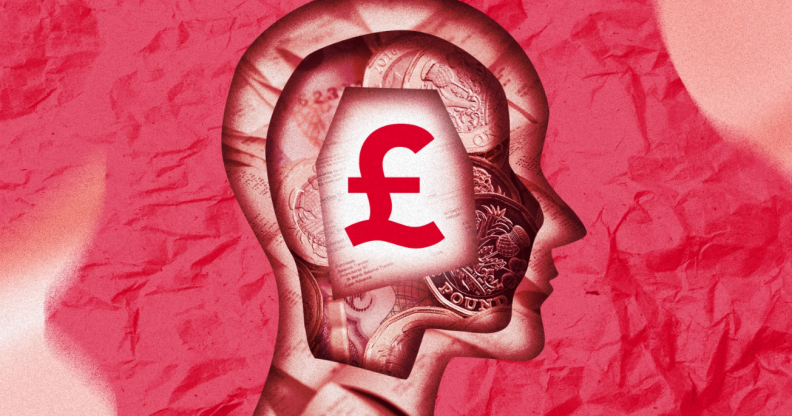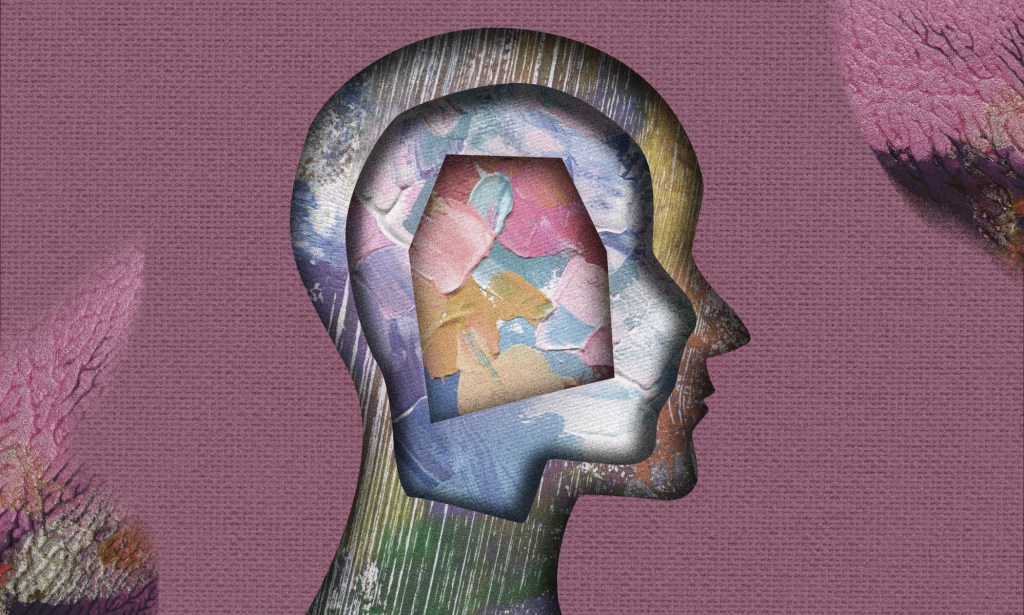‘Your anger is justified’: Experts on protecting your mental health during cost of living crisis

The cost of living crisis is having an impact on people’s mental health. (Getty/PinkNews)
The cost of living crisis is having a deep impact on people’s mental health – here, experts share their advice on how to cope with the stresses.
It comes as little surprise that the cost of living crisis disproportionately impacts the young, the working class and marginalised groups, including LGBTQ+ people.
Soaring costs are forcing safe spaces for queer people to close, preventing people from going out and being with their community, and some trans people are even having to choose between eating and getting gender-affirming care.
A survey carried out by the Office for National Statistics found people’s mental health is suffering as a direct result of inflation, rising energy bills and other increased financial pressures from the cost of living crisis. Money and mental health can form a vicious circle.
Around one in four (24 per cent) of those struggling to afford energy bills experienced moderate to severe depressive symptoms – three times higher than those who found it easier to pay their energy bills (nine per cent).
Dr Emma Kavanagh, a psychologist specialising in trauma and author, tells PinkNews that many have “felt out of control for a long time”, having “lived with an overwhelming sense of threat for more than two years now”.
She adds: “It’s easy to catastrophise and imagine the worst things, but as humans we are notoriously bad at predicting the future. We always forget our own abilities to adapt and to problem solve.

For everyone, constant coverage of the crisis can be difficult to live with – Kavanagh says it’s “OK to switch off the news”.
“Hourly suffering is not compulsory,” Kavanagh says. “I would also suggest doing things that give you a sense of control, even small things like tidying up can help.
“If you are a catastrophiser like me, consider practising mindfulness as a way of controlling where your attention goes, even something like playing video games can help stop the stories for a while.”
Chris Sheridan, founder and director of The Queer Therapist, says sometimes it’s “less about building barriers” to protect yourself and “more about investing in strong connection in community to provide mutual care and support”.
“Fundamentally, if our basic needs (food, shelter, warmth) are under threat, our mental health is inevitably going to be negatively impacted,” Sheridan says. “Unfortunately there’s no quick fix for that beyond circumstances changing and our basic needs being met.”
They describe how the UK is “at a crisis point” and that queer Brits “desperately need systemic change”.
“This is not any one person’s problem, everyone’s mental health is being impacted to varying degrees, of course much more so if you’re part of a marginalised community,” Sheridan says. “The anger, fear, and pain that many of us are experiencing is normal, valid, and justified.”

The cost of living crisis is affecting how people access queer venues, which are vital pillars as folk build community and have the space to freely be themselves. With more people worrying about the lack of disposable income, going out may not be an option, but it’s still important to look at how to foster support systems.
Sheridan says the LGBTQ+ community has “historically always had to find alternative ways to connect” and highlights how social media can be a “lifeline” for people searching for community.
“The online community – be it on Instagram, Twitter, TikTok – has been a huge revelation and lifeline for those who are unable to connect for whatever reason in person,” they add.
“Local LGBTQIA+ groups often organise free to attend in-person and online meet ups and many queer spaces and events offer pay-what-you-can and sliding scale pricing.”
Kavanagh describes humans as ultimately a “social species” and says isolation from support systems can have “profound effects on our mental health”.
“I think it’s important to remember that huge numbers of us are struggling right now and that such feelings are all around us,” she says. “It becomes easier to isolate ourselves when we feel this way, because society tells us we should be ‘coping’.”
Kavanagh says counselling and joining support groups can be “incredibly helpful” while struggling to cope with mental health amid the cost of living crisis.
She adds people can even get a “dopamine high” when interacting with people, whether it’s “something as small as smiling in the street as a stranger”, building online social networks or volunteering to help others struggling with loneliness.
Approximately 45 per cent of adults – roughly 25 million people – feel occasionally, sometimes or often lonely in England, according to the Campaign to End Loneliness. It’s such a pressing issue in the UK that the government appointed a “minister of loneliness” to tackle the social and health issues caused by social isolation.
Over a dozen charities, including Samaritans and Mind, warned prime minister Rishi Sunak about the impact the cost of living crisis is having on mental health and suicide rates.
In an open letter, the charities urged Sunak to “act with speed and compassion to tackle the root causes of destitution and in doing so prevent suicide and an inevitable rise in mental ill health”.
In his first major speech of 2023, the prime minister promised to halve inflation this year to ease the cost of living, acknowledging it’s a pressing issue in the UK.
He failed to mention tackling the UK’s enduring mental health crisis and instead focused on making maths education compulsory for all up to age 18.
Sheridan adds it’s important for queer people to keep in mind the crisis “we are in is systemic”. It’s the result of years of austerity and hard-line capitalism – so, remember to practice self-compassion when looking at the broader picture.
“We are not out of the pandemic yet and many queer and disabled/neurodivergent folk are unable to leave their homes safely,” Sheridan says.
“An awareness of the oppressive systems causing this crisis helps to ground and contextualise what is happening to us as individuals. And this is also where self-compassion is key. Be kind to yourself and hold space for however you’re feeling.”
How did this story make you feel?

